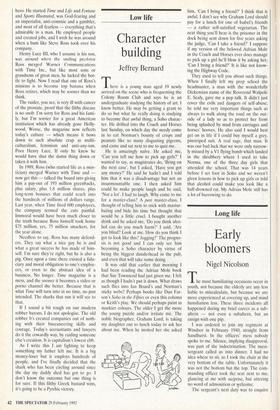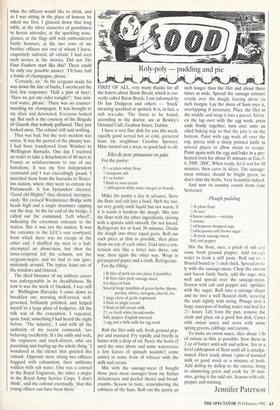Long life
Early bloomers
Nigel Nicolson
The most humiliating occasions occur in youth, not because the elderly are any less liable to miscalculate, but because we are more experienced at covering up, and mind humiliation less. These three incidents all happened during my brief career as a sub- altern — not even a subaltern, but an ensign with one pip.
I was ordered to join my regiment at Windsor in February 1940, straight from Sandhurst. In the officers' mess nobody spoke to me. Silence, implying disapproval, was part of the indoctrination. The mess- sergeant called us into dinner. I had no idea where to sit, so I took the chair at the very bottom of the table. Unfortunately it was not the bottom but the top. The com- manding officer took the seat aext to me, glancing at me with surprise, but uttering no word of admonition or welcome.
The sergeant's next duty was to enquire what the officers would like to drink, and as I was sitting in the place of honour he asked me first. I glanced down that long table, at the silver statuettes of guardsmen in heroic attitudes, at the sparkling wine- glasses, at the flags stiff with embroidered battle honours, at the two rows of my brother officers not one of whom I knew,
exquisitely tailored, all valiant. I had seen such scenes in the movies. Did not The Four Feathers start like this? There could be only one possible answer. 'I'll have half a bottle of champagne, please.'
'Certainly, sir.' As the sergeant made his way down the line of backs, I overheard the first few responses: 'Half a pint of beer'; 'Have we got any cider tonight?'; 'Just min- eral water, please'. There was no counter-
manding my champagne. It was brought to my chair and detonated. Everyone looked up. But such is the courtesy of the Brigade of Guards that nobody guffawed. They just looked away. The colonel still said nothing.
That was bad, but the next incident was worse. It was the period of the phoney war.
I had been transferred from Windsor to Wellington Barracks. One day I received an order to take a detachment of 40 men to France as reinforcements to one of our battalions. It was my first independent command and I was exceedingly proud. I marched them from the barracks to Water- loo station, where they were to entrain for Portsmouth. A few bystanders cheered.
'Good old Blighty!' they shouted, incongru- ously. We crossed Westminster Bridge with heads high and a single drummer tapping out the step. At the far end of the bridge, I called out the command, 'Left wheel!', indicating the cavernous entrance to the station. But it was not the station. It was the entrance to the LCC's vast courtyard, from which there was no escape at the other end. I shuffled my men to a halt, attempted an about-turn, but then the lance-corporal led the column, not the sergeant-major, and we had to run igno- miniously around. The typists leant out of the windows and tittered.
The third bloomer of my military career was unforgettable in its dreadfulness. By now it was the week of Dunkirk. I was still at Wellington Barracks. I came down to breakfast one morning well-rested, well- groomed, brilliantly polished, and helped myself to a large plate of kedgeree. All the talk was of the evacuation. I repeated, quite loud, something I had heard the night before. 'The infantry', I said with all the authority of my recent command, 'are behaving excellently. It's the odds and sods, the engineers and truck-drivers, who are panicking and fouling up the whole thing.' I wondered at the silence that greeted this remark. Opposite were sitting two officers haggard with exhaustion, their uniforms sodden with salt water. One was a colonel in the Royal Engineers, the other a major in the Royal Army Service Corps. 'I don't think', said the colonel eventually, 'that this young officer can have been there.'



















































 Previous page
Previous page